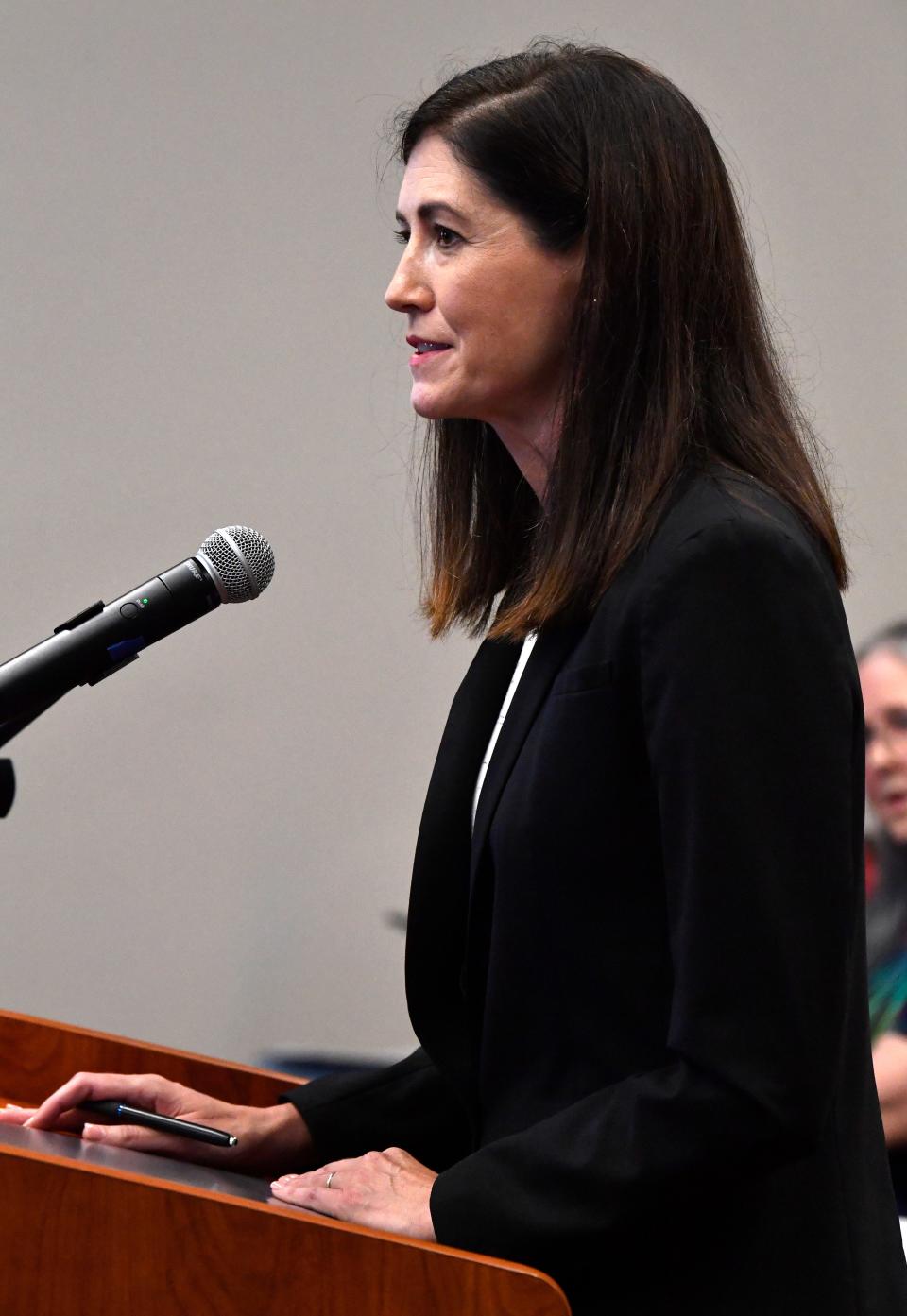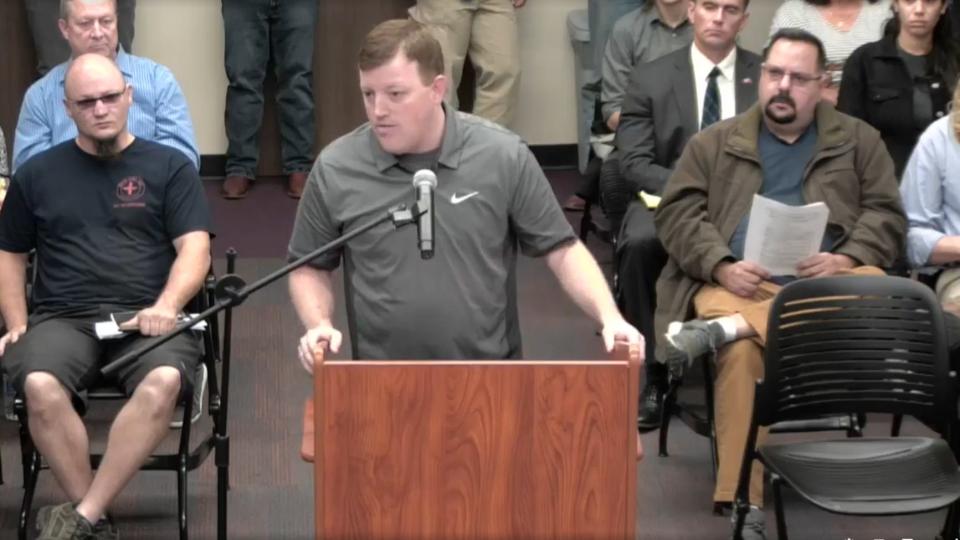Book battle burning over sexually explicit items in Abilene's public library system
A firestorm over books identified as sexually explicit and aimed at teenage or younger readers is boiling over.
A group of 62 adults attended a Monday afternoon Abilene Public Library advisory board meeting, many concerned that these books could get into the hands of children, though some who attended spoke in favor of protecting the books and keeping them openly on shelves.
A total of 32 people spoke at the Abilene Public Library's South Branch, said Julee Hatton, who heads the city's library system.
The library's board approved a policy that places more onus on parents, also voting to creating a three-person committee to review a single book whipping up the greatest winds of discontent.
The parental policy is under review by the city attorney’s office to see if it requires a vote of the Abilene City Council to approve or can be activated via the board’s vote.
Let's talk about 'Let's Talk About It'
The book to be reviewed is “Let’s Talk About It: The Teen’s Guide to Sex, Relationships and Being a Human" by Erika Moen and Matthew Nolen.
Written in a graphic novel format, the book is targeted at teens and contains often explicit illustrations and text detailing topics ranging from gender and sexuality to masturbation, safe sex, sexting, "kinks, fantasies and porn" and how to deal with rejection.
The library has a sole copy of "Let's Talk About It," Hatton said. The book currently is checked out, according to its online card catalog.
It is believed to be in constant check-out by those opposed to its current display at the library.
It's one of about 100 books reportedly identified by those who want to see change, each dealing with human sexuality. Advocates want these books placed in a sequestered section, requiring an adult to check out the materials for minors.
Those concerned about the allegedly explicit materials say they aren't satisfied with the board's measures and want a broader representation by members of the community to decide what gets in the library.
They also aren't happy with the parental-use policy, saying the library itself should more directly partner with parents to police materials.
The Reporter-News has requested a copy of the list of books advocates want to be moved, but a list was not provided as of deadline.
More:Abilene City Council hears arguments pro and con on LGBTQ materials in libraries
Being reconsidered
“Let’s Talk About It” will undergo a process known as “reconsideration,” which allows those who find a library item objectionable to complain.
A form provided by the library asks:
Has the complaining party has reviewed the item in full?
What was found to be objectionable?
What "harmful effects" might result from its use, among other questions, such as if the item contains any instructional, literary or self-development value.

Committee members reviewing the book will consist of the board's chairman, who will appoint two other members to serve. The composition of the committee likely will be determined in the next week, Hatton said.
The board also passed a parental responsibility policy, without amendments, which states parents and legal guardians are responsible for their children's behavior, safety and welfare and that library staff can't act in the place of a parent.
The policy states children and teens may borrow or use any materials, resources or services in the library, except for items that only be can borrowed by those over the age of 18.
Those include games and STEAM (Science, Technology, Engineering, Art and Math) kits, designed to stimulate critical thinking and creativity skills.
The policy places responsibility on parents to determine what is age-appropriate for their children and to monitor the use of resources.
The library will not limit children to the use of books in the children's section as "these materials may not meet the needs and interest of all children." It says parents and guardians should talk to children and teens about the types of materials they think or suitable to borrow or access.
Children and teens may have their own library cards, the policy states, though parents and guardians are responsible financially for equipment and items checked out. It further states parents should ideally be present to supervise use of library equipment, including copiers, computers and laptops.
This book is 'pornography'
Parent Ryan Goodwin identifies as just one voice among the loose coalition of individuals, mostly made up of parents and grandparents, he said, who have spoken in recent weeks with concerns regarding library materials.
To Goodwin and others who support the cause, one word defines "Let's Talk About It," he said.
"Pornography," he said. It's geared toward minors, something he and others have said directly contradicts the state’s penal code.
Like others, Goodwin said the book "should have actually never been in our library.”
“I think with the city, and a lot of people we've talked to, they're in agreement with us, that book does not need to be there," he said.
Goodwin said the book brings up concerns of what other materials in the library might be “slipping through the cracks."
“What else are children looking at?” he said, adding the group has found a “pattern of books that have gone in there with questionable, sexually explicit material.”
"Let's Talk About It," though targeted to teens, was shelved in the adult nonfiction section by librarians when added to the library because of its content, Hatton said.
“We do have some local control over where an item is shelved,” she said, adding the book has received two formal complaints against it.
Goodwin and others argue, however, that the book was on an end cap, at least at the time it was found by a person at the library - a place where it could be access by minors.
“I know that they're trusting the word of a librarian saying no, this wasn't there,” he said. “But it clearly was there at that time. … So somebody's just not telling the truth.”
Some support choice, with caution
Former teacher Monica Warn-Walker said some in the LGTBQ community also have been struck by the graphic nature of "Let's Talk About It" − and she herself isn't certain it's appropriate for all ages.
The Abilene Public Library's advisory board is comprised of chairman Clint Buck, Dorothy Davidson, Tim de la Vega, Jason Hernandez, Denise Moore, Elizabeth Norman and Joe Specht.
"I don't know that most young teens would be mature enough to read something like that," she said.
But that doesn't mean that books that openly discuss sexual orientation, gender and other issues − "Let's Talk About It" contains multiple references to gender and sexual identities and orientations among its pages − don't deserve a place on the library's shelves, she said.
James Sargent, a recent Abilene City Council candidate, said he and his wife are foster parents and preparing to adopt.
The library's updated parental responsibility policy is an important key, Walker said, and reflects her own values as a parent and grandparent.
"Even though something is in the children's section, it doesn't mean that it's appropriate for my 6-year-old granddaughter," she said. "It may be that she's already outgrown that. Or it may be she's not mature enough for something."
Walker said that when her child and later grandchildren were visiting the library, it was important to her to look at what they were reading.
"If it was content that I thought might be above their head, well, then that's something we could at least discuss together," she said.
What books get on shelves
Many different things are looked at when selecting materials, from reviews in “Library Journal,” “Book List” and “Publisher’s Weekly,” to the popularity of a particular author, Hatton said.
A number of copies for the new James Patterson novel, for example, will be ordered due to the author's popularity, Hatton said. Vendors also share information about new works in particular categories.
But the current policy "values comments from the public and the community at large,” she said, about what goes into the library.
In general, books targeted to children range from birth to age 12, while young the term "adult/teen" is used interchangeably for ages 13-18.
Anything above is considered a book for adults, Hatton said.
Publishers provides guidance on an intended audience based on appropriateness for stages of emotional and intellectual maturity, as well as reading level.

Asked about the roughly 100 other books the group reportedly has reportedly identified, Hatton said “Let’s Talk About It” is the only book that’s received a request for reconsideration.
“We haven't received any list or anything like that,” she said Wednesday. “So I would say we use the procedure that we have in place, and then we depend on our parental responsibility policy.”
Ultimately, libraries “are for everyone,” Hatton said.
“But we do take into account the community that we’re in,” she said. “That is why we have the formal process for reconsideration. That's why it's there. And if people really, really feel strongly about a certain title, then that's what I would encourage them to follow. We take it seriously, and the board members take it seriously.”
No one group targeted
Though some of the books explore themes related to the LGBTQ community, Goodwin emphasized the goal of those gathered who have attended recent council and board meetings was “not going after people that live alternative lifestyles.”
Some of the targeted books may have “heterosexual explicit content," for example, he said.
Advocates want all of the books they see as problematic put in a separate section, Goodwin said.
“It's basically explicit materials sectioned off so parents have the ability to take their kids and – when their maturity is ready – we can start gradually sharing (those concepts)," he said.
Goodwin said he has a 6-year-old child who isn’t ready for the books under question and complained that “a lot of the people” that are arguing for wider exposure “don't have kids.”
“We have a policy that the library's trying to push through that pretty much says, ‘We're not responsible for what your children look at in here,’” he said. “That's what we see it as.”
In his opinion, the library’s new parental policy removes responsibility from librarians, something he and other supporters want to see more of.
Identifying himself, like Goodwin, as only a single voice among many, Sargent said the questions being posed are simple.
“We're saying: What is appropriate for a five-year-old?” he said, adding "our tax dollars have been used to fill these materials.”
He, too, said the parental responsibility policy gives librarians a pass.
“I understand they may get thousands of books per year,” he said. “But there should be some consistency, some vetting process that is the safest practice for all members of our community.”
Sargent draws on personal experience as a foster parent for his concerns.
“At any given time, we have varying number of kids and a varying number of ages in our home or in our care,” he said. “... I would love to be able to take them to the library.”
But Sargent said he was worried about foster children stumbling across materials that could “induce trauma, or at least possibly store up trauma, from their past.”
“That’s one of my biggest concerns,” he said. “… If it’s harmful for a kid, it’s harmful.”
Who decides?
Goodwin said he and others also find the three-person committee to review “Let’s Talk About It,” made up of only current library board members, a less-than-ideal choice.
Yet, he believes the book will be removed.
“They're lucky they're not in a lawsuit right now over it,” he said.
Goodwin said he and others don't believe the current board reflects predominant values − though he quickly added other voices shouldn't be shut out.
“What I am saying is that we've clearly lost track of who our population is,” he said. “... We are asking for representation and to honor the Christian values that a lot of us have.”

To Goodwin and others, there are solutions that allow materials to still be available, while also allowing parental control.
“We think that's fair,” he said. “We're not saying, ‘let's have a book burning.’ ... What we’re saying is let’s move them to place where we don’t expose children to them, and when it comes time, and the children are mature enough, then we can have discussions.”
Brian Bethel covers city and county government and general news for the Abilene Reporter-News. If you appreciate locally driven news, you can support local journalists with a digital subscription to ReporterNews.com.
This article originally appeared on Abilene Reporter-News: Book battle burns over sexually explicit items in Abilene's libraries

